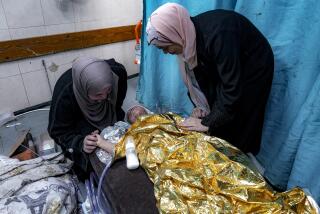A precious few steps at mission’s end
- Share via
BAGHDAD — For months, U.S. Army Staff Sgt. Luis Falcon patrolled the downtrodden neighborhoods of Baqubah, where Sunni Muslim extremists had tried to create an Islamic caliphate. One day, he came upon a young girl sitting in an old, oversized wheelchair, blood crusted on the stumps where her legs had been.
Her name was Shahad Abbas Aziz, and on Friday, the 12-year-old sat patiently in a clinic in Baghdad’s Green Zone while doctors measured what remains of her legs. Later, the physicians would make prosthetic limbs to replace the ones blown off by a bomb.
As Shahad perched on the edge of the examination table, wearing a denim jumper and lime-green earrings, Falcon stood behind her and related the extraordinary events that brought them to this point and that have changed both of their lives.
It began seven months ago when Shahad was on her way home from school with her 10-year-old brother, Ali Abbas Aziz. A roadside bomb meant for U.S. forces exploded beneath them.
“The Iraqi doctors thought that she was going to die and he was going to live, but what happened was the opposite,” said Shahad’s mother, Waheda Jabbar Mohammed.
Shahad was left with both legs amputated below the knee. Her brother died in a hospital several days after the blast.
A few weeks later, Falcon was on a routine patrol when he came upon Shahad in her wheelchair.
“All I want is legs to walk to school,” she told him.
Thus began a herculean effort to bring Shahad to Baghdad to be fitted with proper limbs, an effort hampered by everything from military bureaucracy to dust storms but finally achieved just three weeks before Falcon is due to end his Iraq tour.
Late Friday afternoon, doctors at the Ministry of Defense Prosthetics Clinic, which is attached to the U.S.-run Ibn Sina hospital in the Green Zone, finished creating Shahad’s legs and she walked briefly on them, using parallel bars for balance. She’ll return for more therapy until she is able to walk on her own.
Falcon’s biggest fear is that the unit that replaces his won’t follow up with the family, which has five surviving children in addition to Shahad. The father earns money by hauling goods in a donkey-drawn cart.
“I can’t order them to do what I’ve done. It has to come out their heart,” said Falcon. “They might say, ‘I don’t want to waste time here.’ ”
For months after first meeting Shahad, Falcon would visit her family at its humble home in Baqubah. Soldiers brought food, water, a heater in the winter, and a new wheelchair for Shahad.
Each time he visited, Falcon, 38, of New York, found that while other children clamored for soccer balls, PlayStations, or money, Shahad never asked for anything except legs.
But time was running out for Falcon, whose 15-month deployment ends this month.
He began pushing her case up the chain of command. He went to his platoon leader, who went to the battalion commander, who went to the brigade leader. As Falcon’s departure neared, he lost hope, until one day a man named Jerry Gardner approached him and said, “I’m here to help you.”
Gardner is a public health advisor working in Iraq on one of the U.S. State Department’s Provincial Reconstruction Teams. He apparently provided the final push needed to get treatment for Shahad.
Getting Shahad to Baghdad proved a challenge. Baqubah, the capital of Diyala province, is only 35 miles northeast of Baghdad, but Falcon worried about roadside bombs if they drove.
Finally, working around frequent dust storms, they arranged a military helicopter flight for Shahad and her mother on Thursday. The flight ensured they could make it to the Green Zone on Friday morning for the fitting.
The procedure involved using a wand to scan images of Shahad’s limbs into a computer so that perfectly fitted, comfortable sockets could be constructed. Shahad’s upper legs fit into the plastic sockets, and the artificial limbs and feet are attached below.
Asked what she wanted to do most once the limbs were ready, Shahad said, “I just want to walk.”
Her mother said Shahad has suffered emotional distress since the bombing and misses her brother, but she has dreams of becoming a doctor.
“This was what I needed,” Falcon said of his encounter with Shahad. Until then, he had wondered about his mission in Iraq.
“Doing this right now, I’ll do as many tours as I need,” he said.
--
More to Read
Sign up for Essential California
The most important California stories and recommendations in your inbox every morning.
You may occasionally receive promotional content from the Los Angeles Times.














